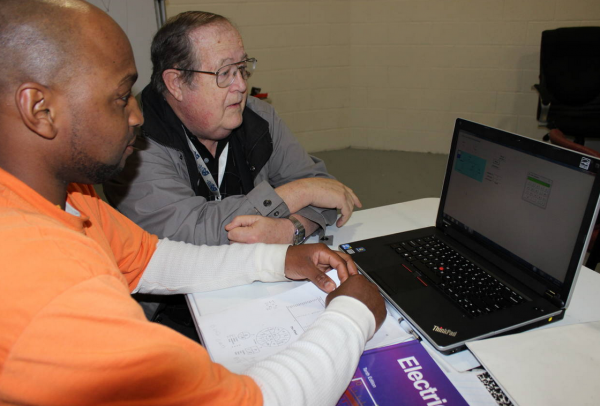Student Carlos Crawford concentrates intently as he builds circuit boards on a laptop computer in a Beginning Fundamental Electrical class offered by Tennessee Technology Center .
Teacher David Lewis guides Crawford through a hands-on experience so he will learn the skills to support himself and his family once he’s released from the Rutherford County Adult Detention Center .
Crawford, a former student at Austin Peay State University and Cumberland University , is among seven inmates taking the class held two or three nights weekly at the jail. Their families paid almost a $300 fee for the class.
“I really want to learn the skill,” Crawford said in describing why he registered for the class.
Crawford hopes to continue the classes when he finishes his time this month.
Sheriff Robert Arnold said the classes follow his philosophy of “Give a man a fish and he will eat for a day but teach a man to fish and he will eat for life.” Teaching inmates skills may reduce their chance of returning to jail.
Other educational programs at the jail include the Garden of Hope and GED classes to help inmates get their equivalent of a high school diploma.
Detention Lt. Chris Deal, who worked with Tennessee Technology Center to establish the class, said it costs about $20,000 a year to house an inmate. Through the class, the detention center hopes inmates will learn a skill and not return to jail.
“We’re trying to reduce recidivism and teach someone a skill they can apply when they get out,” Lt. Deal explained. “They already have strikes by maybe not having a good work history and being convicted of a crime. We are trying to teach a skill set so they can be a productive citizen and a taxpayer.”
Sheriff Arnold, Lt. Deal and Jail Commander Guy Goff worked closely with TTC Director Lynn Kreider to offer the class. No taxpayers’ dollars are used to fund the tuition.
Kreider started similar programs for incarcerated people in three other states. One of his first jobs in education was to provide special training for offenders who were going to be paroled. He’d like to say the classes changed everyone’s life.
But one of the obstacles of teaching inmates is that it may be difficult to change their lives. For example, earning $20 an hour doesn’t compare to the salary earned by selling drugs so convicts may go back to crime.
“It gives them hope,” Kreider observed. “We can give them tools and point them in the right direction. We prepare students for jobs.”
Instructor David Lewis, who teaches at the jail and TTC, faced his own hardships. He served in the military more than 22 years, served as a correctional officer for a few months in the Tennessee State Prison and worked in the industrial electrical maintenance field until he became disabled in a car crash.
He was hired as the instructor at TTC and now the jail. His wife, Jenetta, who works at the TTC bookstore, found less expensive books for the students to use.
The inmate students seem very earnest in taking the class. Taking the class doesn’t take time off their sentence.
“The only thing they get is the learning factor, their direct reward,” Lewis said. “They can use it for furthering their education.”
Many of his TTC students who complete the course earn about $16 to $17 per hour in entry level positions. Lewis hopes to expand the classes at the jail.
“I commend Sheriff Arnold,” Lewis said. “The sheriff is pushing to educate people so they won’t come back in the system.”
Lt. Deal said by the inmates’ families paying for the tuition, they have a responsibility to attend. After completing the class, the students can work on repairing heating units or air conditioners.
“We’re trying to instill something so they won’t come back and we can cut costs to taxpayers,” Lt. Deal said.
Besides the students, TTC offered a scholarship to Deputy Keith Fann who is monitoring the inmates and taking the class as well to learn another skill.
For Crawford, who’s scheduled to be free Sunday, the classes are the beginning of learning a new skill. He doesn’t yet know if he will stay with the classes, try to get a job or return to college. He seems drawn to the electrical field.
“Electrical is something I want to do,” Crawford said. “There’s good money in it.”
Source:
Lisa Marchesoni
Public information officer
Rutherford County Sheriff's Office












